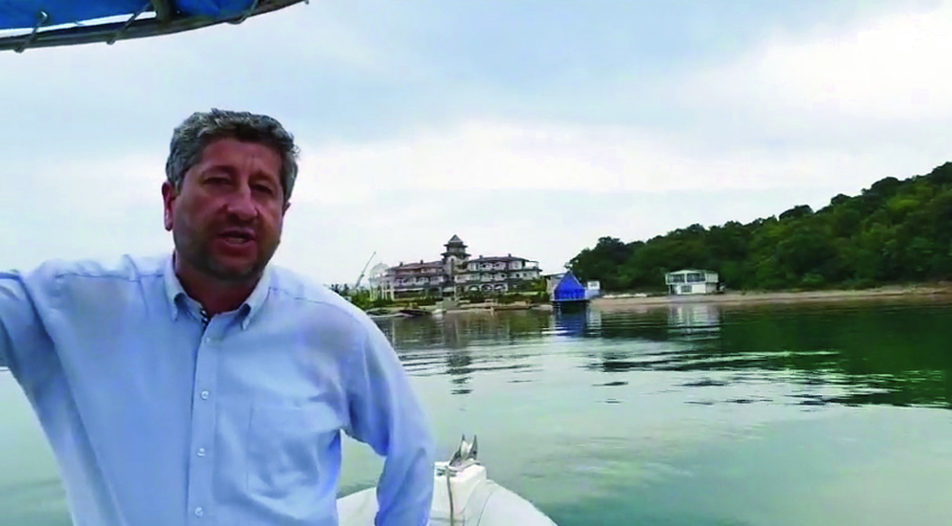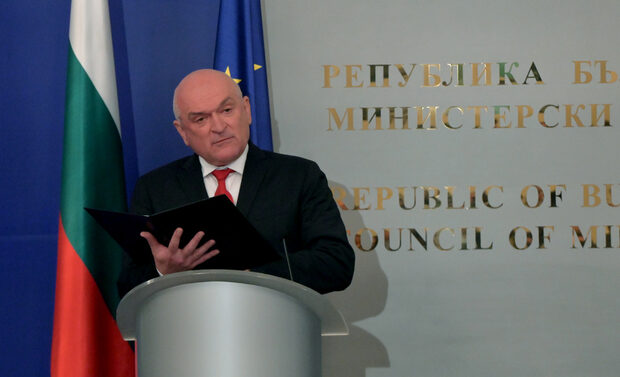After a decade in power, it really appeared that nothing could topple the government of Prime Minister Boyko Borissov, until a small inflatable boat with three passengers entered the bay of Rosenets, just south of Burgas on the Black Sea, on 7 July.
Onboard, recording and broadcasting live on Facebook, were Hristo Ivanov, leader of Yes, Bulgaria - one of the three parties forming the Democratic Bulgaria liberal centrist coalition - and two other politicians from the party. Their simple, but - as it transpired - extremely efficient publicity stunt would make headlines even in pro-government media outlets and would set the country on a political crisis that could, conceivably, bring down the ruling GERB-led government.
Mr Ivanov and his colleagues were attempting to reach a nominally public beach in the bay of Rosenets, only to be tackled by unmarked officers from the National Protection Service (NSO), a militarized force enlisted to protect high-level public figures. The officers were guarding the nearby mansion of Ahmed Dogan, honorary chairman of the ethnic Turkish corporate party Movement for Rights and Freedoms (MRF).
The four-storey mansion with its own marina has no documental trace to Mr Dogan, who himself has never worked at anything else other than a politician. It has been constructed on the edge of the law, with the complicity of several local and national institutions. Media outlets, including Capital Weekly, have investigated its genesis and have described the long sequence of controversial decisions of the Burgas administration (led by GERB) that gave the green light to its construction. Moreover, Mr Dogan has been under the protection of the NSO for years, despite being out of public affairs for the past seven years and holding no official role, except that of a businessman.
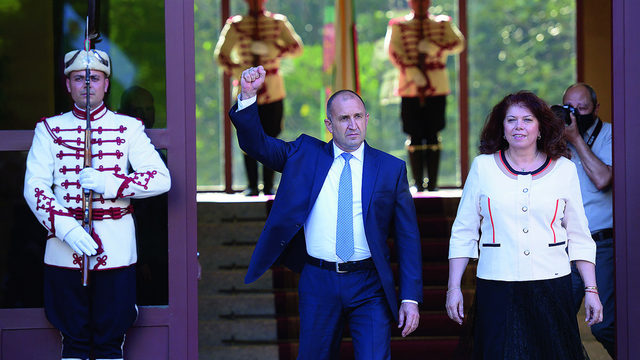
So the goal of Mr Ivanov was two-fold - highlighting that Mr Dogan and his ownership over a public beach are off-limits to ordinary Bulgarians, and to showcase how the leader of MRF is practically a ruler above the law and protected by the state. The video of Mr Ivanov being tackled by the NSO seemed to vouch for both of his points and triggered a series of events that resonated more powerfully than any other recent scandal.
Later the same day, Ivanov posed the inevitable question to President Rumen Radev, formal principal of NSO, and to Mr Borissov, who de facto nominates the head of the service. Why are Mr Dogan and his MRF colleague, mogul Delyan Peevski, protected by the office, and why is the beach - a default public space - off-limits to the public?
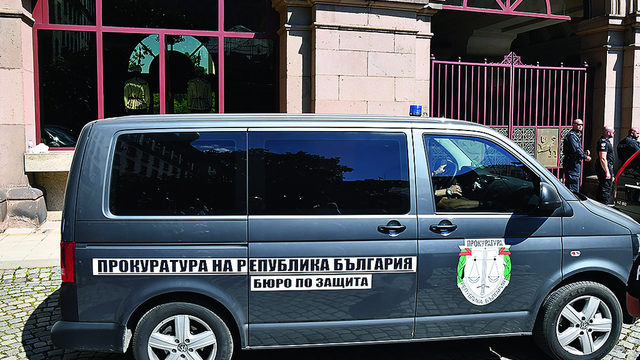
The following day, President Radev gave a briefing where he condemned the violent ejection of Ivanov by NSO and asked its head to take steps towards suspending its protection of Mr Dogan and Mr Peevski. This, however, would require the agreement of the Secretary-General of the Police and the head of the National Security Service (DANS), both under the command of Mr Borissov, the president said.
As Mr Borissov rarely, if ever, does anything that may put him at odds with Dogan and Peevski, he tried to kick the ball back into Radev's field. Later the same day he responded that he was not responsible for deciding whom NSO protects, only to retract his words a few days later and announce he has instructed the heads of the Police and DANS to drop Dogan and Peevski's security.
On the following day, 9 July, the State Prosecution, headed by Ivan Geshev - a controversial figure linked to the MRF lobby in the judiciary, unexpectedly raided the presidential administration. While the official aim of the raid was an ongoing investigation into alleged influence-peddling by Mr Radev's advisor, the highly publicized operation convinced many that the Prosecution was pressuring the president on account of his position on the MRF VIPs.
This resulted in a spontaneous series of protests against the arbitrary actions of the Prosecution and the perceived role of Mr Borissov that brought together citizens of various political persuasions. From supporters of President Radev and the party that nominated him - the Bulgarian Socialists from BSP, though backers of liberal Democratic Bulgaria, to political opportunists such as ex-Ombudsman Maya Manolova.
At the end of the protest, President Radev gave a speech, calling for the ousting of the "criminal thuggish" government and prosecution - a call he repeated in a televised statement on 11 July, when he explicitly called for the resignation of Mr Borissov's government and that of Prosecutor General Geshev.
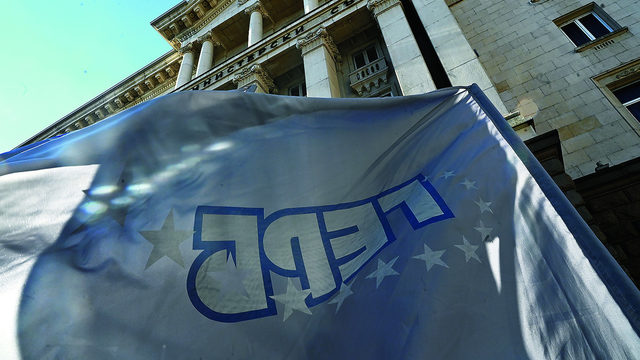
Then, Mr Borissov made a second strategic mistake. On 10 July, as the protests against the government were escalating, the news broke that GERB was bringing in supporters for a counter-protest, which ignited public tensions even further. On the same evening, thousands of people flocked to the government district of Sofia, half of which protested against the GERB government and the other half - backing it.
That night also saw several extremely brutal cases of police violence against anti-government protesters, which riled the public even further, especially after the authorities said they would not investigate the police officers who had overstepped their authority.
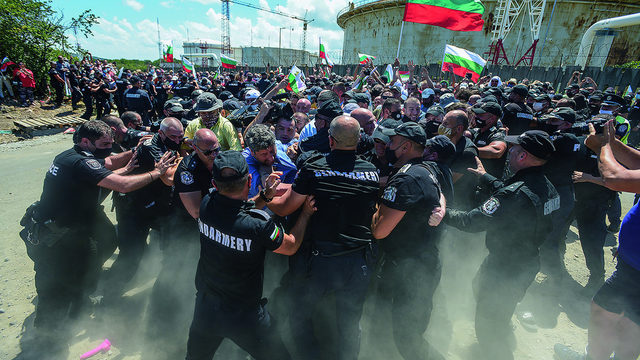
Meanwhile, on 11 July, Democratic Bulgaria activists, led by Hristo Ivanov, repeated their attempt to reach the beach near the property that Mr Dogan occupies, but apparently has nothing to do with, only to be met by a cordon of state policemen, who were at the same time allowing MRF activists to enter the property.
MRF and Mr Dogan brought up to 5,000 men, predominantly ethnic Turks from different parts of the country, to physically protect the lavish mansion. It is likely that they expected - or even planned - a potential conflict between the predominately ethnic Turkish MRF supporters and the rest of the protesters. Yet the protesters stuck to their rule of law agenda and anti-mafia chants engaged amicably with MRF supporters and even sang the Bulgarian anthem when they were finally allowed on the beach. Despite some petty bullying by the police, the protest went off peacefully and proved a significant moral and publicity coup for Democratic Bulgaria, which are trying to keep their rule of law agenda separate from the agendas of anti-Borissov political opportunists and backers of President Radev.
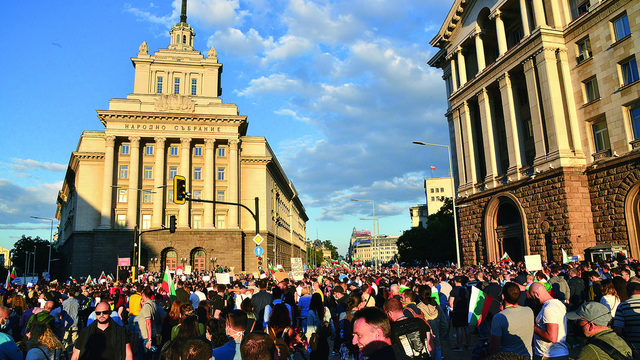
It's no exaggeration to say that the government, as well as Prime Minister Borissov personally, have completely botched their response to the crisis. Mr Borissov blatantly contradicted himself on several occasions, trying to blame the president for the protection of Mr Dogan and Mr Peevski, only to confirm he would ask his subordinates to cease the protection subsequently. GERB has tried to link the protests with pro-Russian interests that aim to punish Bulgaria for its Euro-Atlantic orientation. The Prosecution, on its side, tried to convince the public that the protests were funded by exiled ex-oligarchs Vassil Bozhkov (in Dubai) and Tsvetan Vassilev (in Belgrade) by releasing wiretapped conversations of the former in which he claims he is paying the organizers of the protest. Both theses seem absurd and have so far only served to exacerbate public anger. The lack of response to the incidents of police brutality has also fueled tensions.
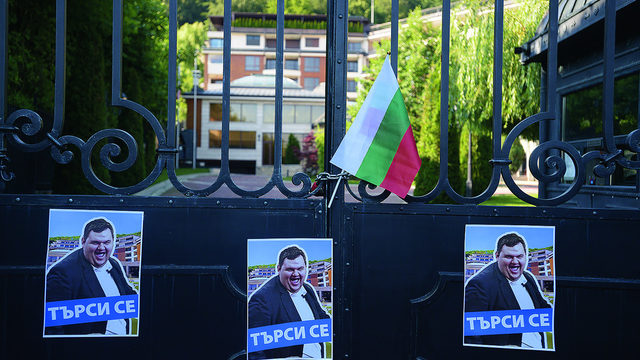
It is likely that protests will continue in the short term. Firstly, they remind people of the hopeful 2013 protests against the Plamen Oresharski government as they were also fueled by the government's inability or unwillingness to distance itself from Mr Peevski and the MRF, seen as a form of "deep state" by the general public. Secondly, the government's steadfast scapegoating of protesters is only exacerbating public hostility. Last, but not least, while the protests were sparked by particular incidents, they are the product of a long-brewing public dissatisfaction with governance and perception of corruption within GERB and the State Prosecution.
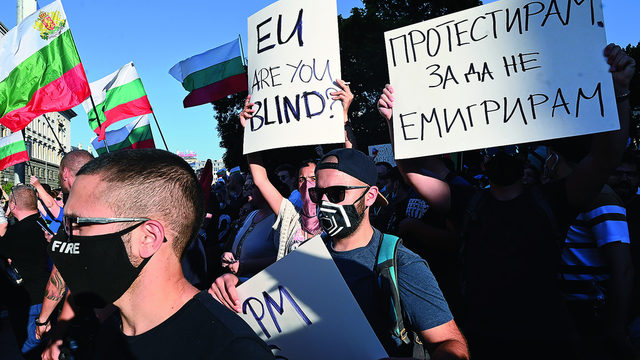
It is hard to predict the outcome of the protests as there are very few concrete demands made by the protesters, who mostly oppose what they see as Mr Borissov's exhausted government and the arbitrariness of the police and the State Prosecution. Mr Borissov insists he will not resign early, as he had done twice already in 2013 and 2016. Yet he faces a conundrum. On the one hand, he stands to lose out the longer he clings on to power in the current environment, but he also does not want to allow a hostile President Radev to form an emergency cabinet, which would surely pursue GERB's wrongdoing over the past years. It is just as unlikely that Ivan Geshev will resign as prosecutor general, as he has the full support of the Supreme Judicial Council that elected him with almost total unanimity in November 2019.
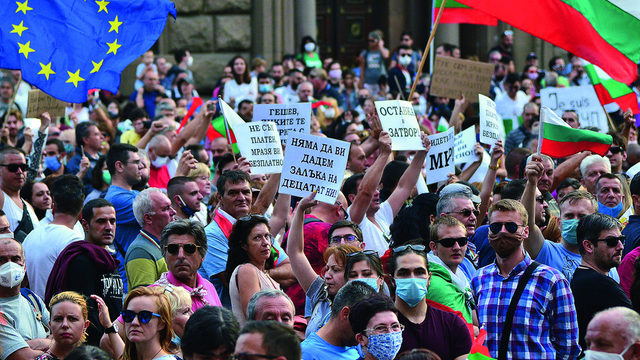
Political opportunists of all sorts have tried to take advantage of the ensuing chaos, which may stain the genuine civic dissatisfaction against Mr Borissov's government. Yet, if this is true, it can only be demonstrated at the next elections. For the time being - it's protest time in the heart of Sofia.
After a decade in power, it really appeared that nothing could topple the government of Prime Minister Boyko Borissov, until a small inflatable boat with three passengers entered the bay of Rosenets, just south of Burgas on the Black Sea, on 7 July.
Onboard, recording and broadcasting live on Facebook, were Hristo Ivanov, leader of Yes, Bulgaria - one of the three parties forming the Democratic Bulgaria liberal centrist coalition - and two other politicians from the party. Their simple, but - as it transpired - extremely efficient publicity stunt would make headlines even in pro-government media outlets and would set the country on a political crisis that could, conceivably, bring down the ruling GERB-led government.








